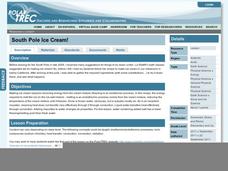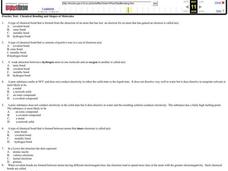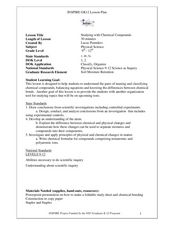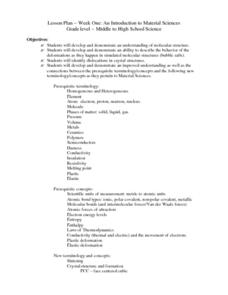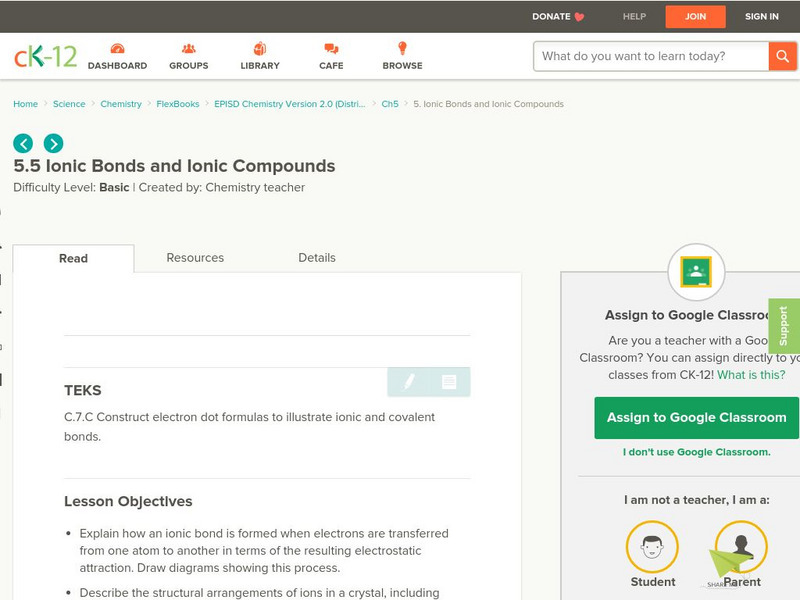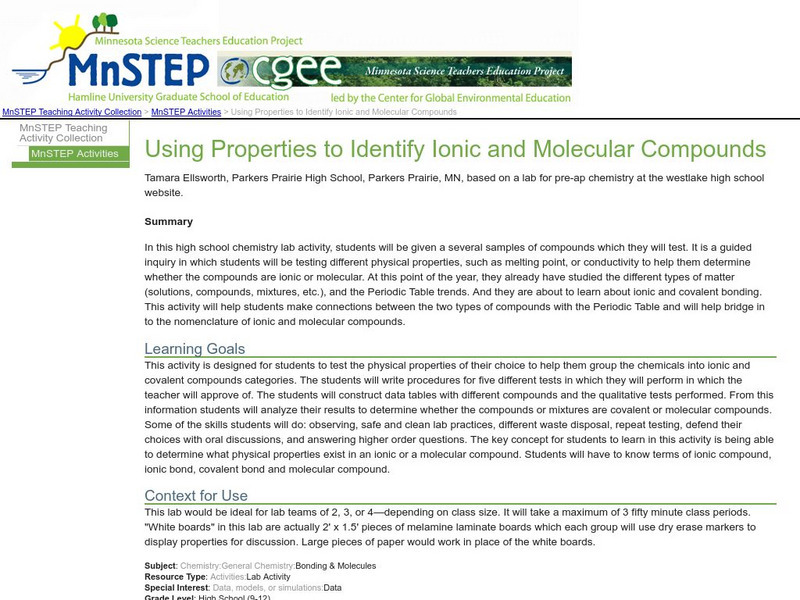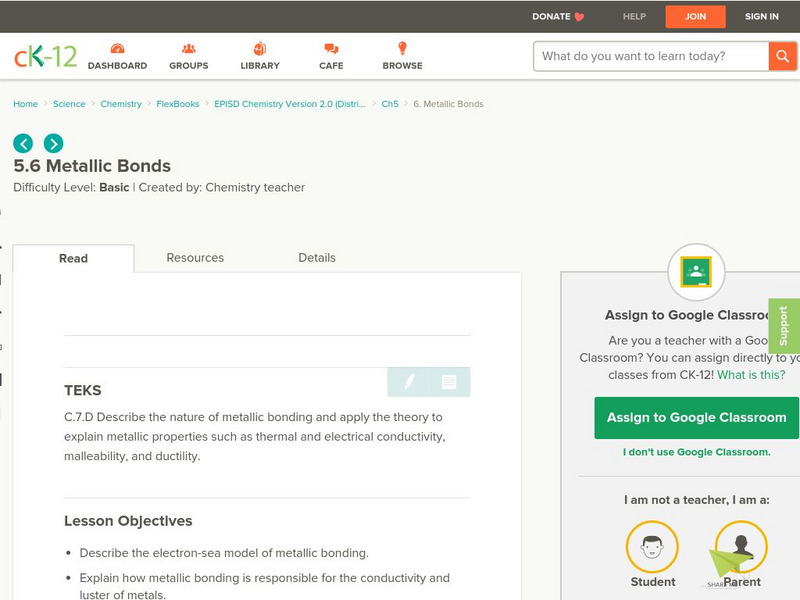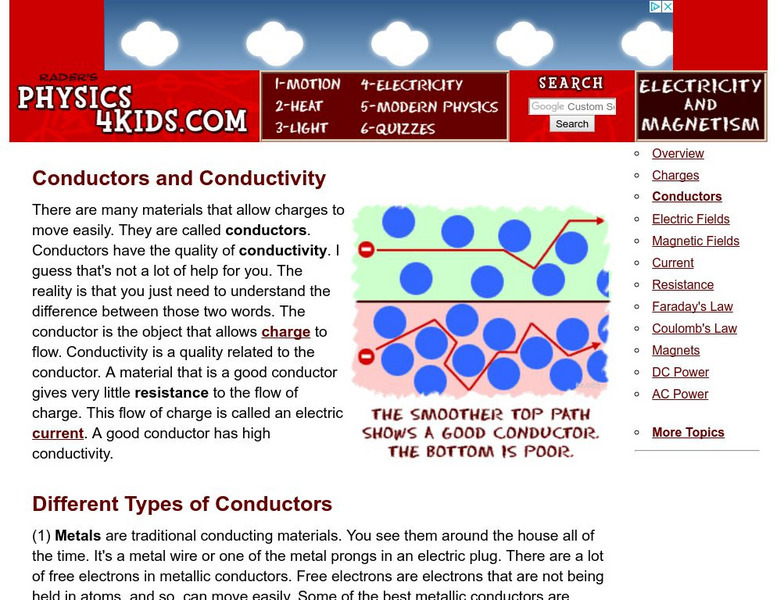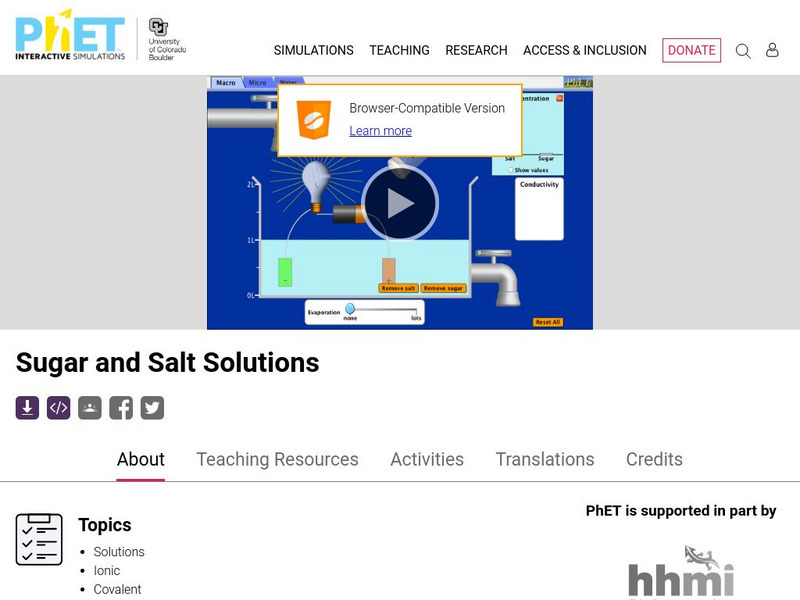Curated OER
Chemical Bonding and Shapes of Molecules
In this chemical bonds worksheet, students review the different types of bonds, Lewis dot structures, ions, and molecule shapes. This worksheet has 10 matching, 17 multiple choice, and 3 drawing questions.
Polar Trec
South Pole Ice Cream!
How can you turn an ice cream activity into a scientific investigation? It's easy if you know ionic compounds, heat transfer, and the exothermic and endothermic process. Learners will explore the science behind freezing, insulation, and...
Alabama Learning Exchange
Float or Sink?
Experiment with mass and density as scholars figure out what makes things float or sink. First, they watch a podcast introducing these concepts. Be sure to use the comprehension question to test their understanding. Young scientists...
Curated OER
Charge and Electricity
In this charge and electricity worksheet, students read about electric charges and how they are created in atoms. They also read about the unit of charge, called the Coulomb, conductors, and insulators. Emerging electricians match 11...
Curated OER
Chemical Bonding and Shapes of Molecules
In this chemical bonding instructional activity, students review the different types of bonds and calculate the number of valence electrons in molecules. This instructional activity has 11 matching and 15 multiple choice questions.
Curated OER
How is the Strength of an Acid Determined?
Students study acids and how they can be measured. In this acid lesson students distinguish the properties that create strong and weak electrolytes.
Curated OER
Rusting-A Form of Oxidation
Students conduct an experiment to observe oxidation. In this chemistry lesson, students explain how rusting happens. They rank metals according to their conductivity.
Curated OER
Properties of Metals
In this metals worksheet, students define delocalized electrons and review the properties of metals. This worksheet has 5 short answer questions.
Curated OER
Rusting-A Form of Oxidation
Students observe the rusting process in the lab. In this chemistry instructional activity, students rank metals according to their conductivity. They give real world applications of this activity.
Curated OER
A Solution for Precipitation
Young scholars predict the product of chemical reaction using the solubility rules. For this chemistry lesson, students balance ionic equation. They perform a lab to check if their predicted products are correct.
Curated OER
Flame Test
Learners conduct a flame test on different substances. In this chemistry lesson, students predict the element present based on the color emitted during the flame test. They explain how different elements produce different colors.
Curated OER
Studying with Chemical Compounds
Students create a foldable to help them remember topics on chemical compounds. In this physical science lesson, students differentiate ionic and covalent compounds. Given certain compounds, they identify whether it's ionic or covalent.
Curated OER
Unit 7 Acid and Base
A series of 25 multiple choice questions is presented to chemistry learners to review properties of acids and bases. A page of notes precedes the questions and contains information about the Arrhenius and Bronsted-Lowry definitions,...
Curated OER
Writing Chemical Formulas
Students study how to write chemical fomulas by reviewing the combinations atoms form into compounds. They write a procedure to test various substances and name the compounds and write formulas. As they construct models for formulas and...
Curated OER
Tie Dye
Students practice writing research proposals to test the color fastness of a dye once it has been exposed to a t-shirt. Each proposal needs details of experimental design, length of treatment, and means of cleaning the shirt. All...
Curated OER
Solubility and Intermolecular Forces
In this solubility and intermolecular force worksheet, students are given 26 clues about forces between molecules such as hydrogen bonds and London forces and about solubility of solutions.
Curated OER
Nervous Tissue
In this nervous tissue worksheet, students list and describe the functions of the nervous system and its two principle parts. Then they list and give the function and location of the six types of glial cells. Students also describe two...
Curated OER
An Introduction To Material Sciences
Young scholars investigate the concept of molecular structure. They describe the behavior of simulated molecules and identify any dislocations in crystalline structures. They also define various related vocabulary words and use them in...
CK-12 Foundation
Ck 12: Ionic Bonds and Ionic Compounds
[Free Registration/Login may be required to access all resource tools.] In the following online tutorial students will learn to explain how an ionic bond is formed when electrons are transferred from one atom to another in terms of the...
Utah Education Network
Uen: Conductivity and Bonding
Students will measure the conductivity of several compounds and solutions in order to predict the bond types (ionic or covalent) in the substances tested.
Science Education Resource Center at Carleton College
Serc: Using Properties to Identify Ionic and Molecular Compounds
A guided inquiry in which students test different physical properties, such as melting point or conductivity, to help them determine whether the compounds are ionic or molecular.
CK-12 Foundation
Ck 12: Metallic Bonds
[Free Registration/Login may be required to access all resource tools.] In the following online tutorial, students will begin to describe the electron-sea model of metallic bonding. They will explain how metallic bonding is responsible...
Physics4kids
Physics4 Kids: Electricity and Magnetism: Conductors and Conductivity
A brief overview of several type of conductors.
University of Colorado
University of Colorado: Ph Et Interactive Simulations: Sugar and Salt Solutions
What happens when sugar and salt are added to water? Pour in sugar, shake in salt, and evaporate water to see the effects on concentration and conductivity. Zoom in to see how different sugar and salt compounds dissolve. Zoom in again to...



